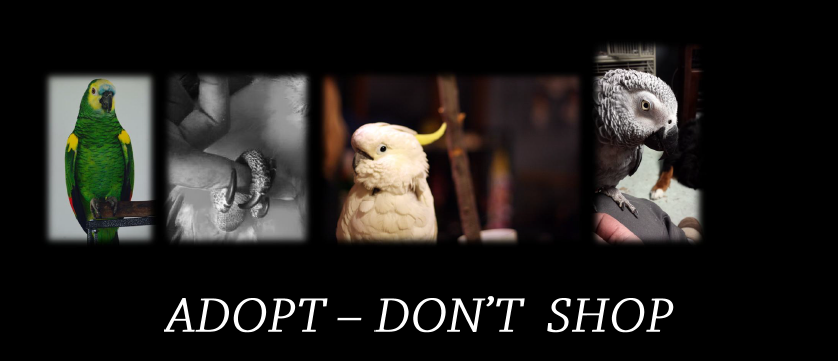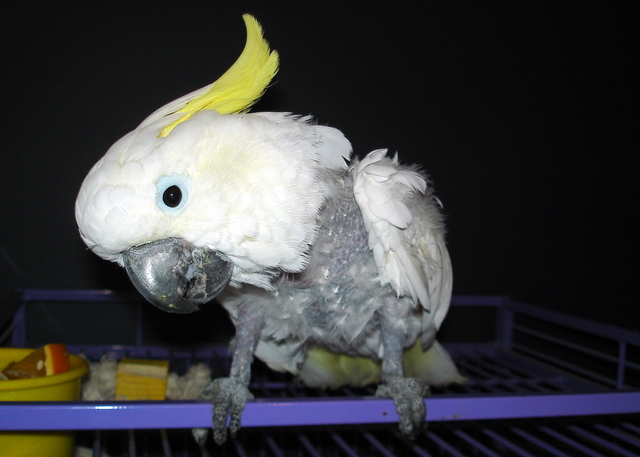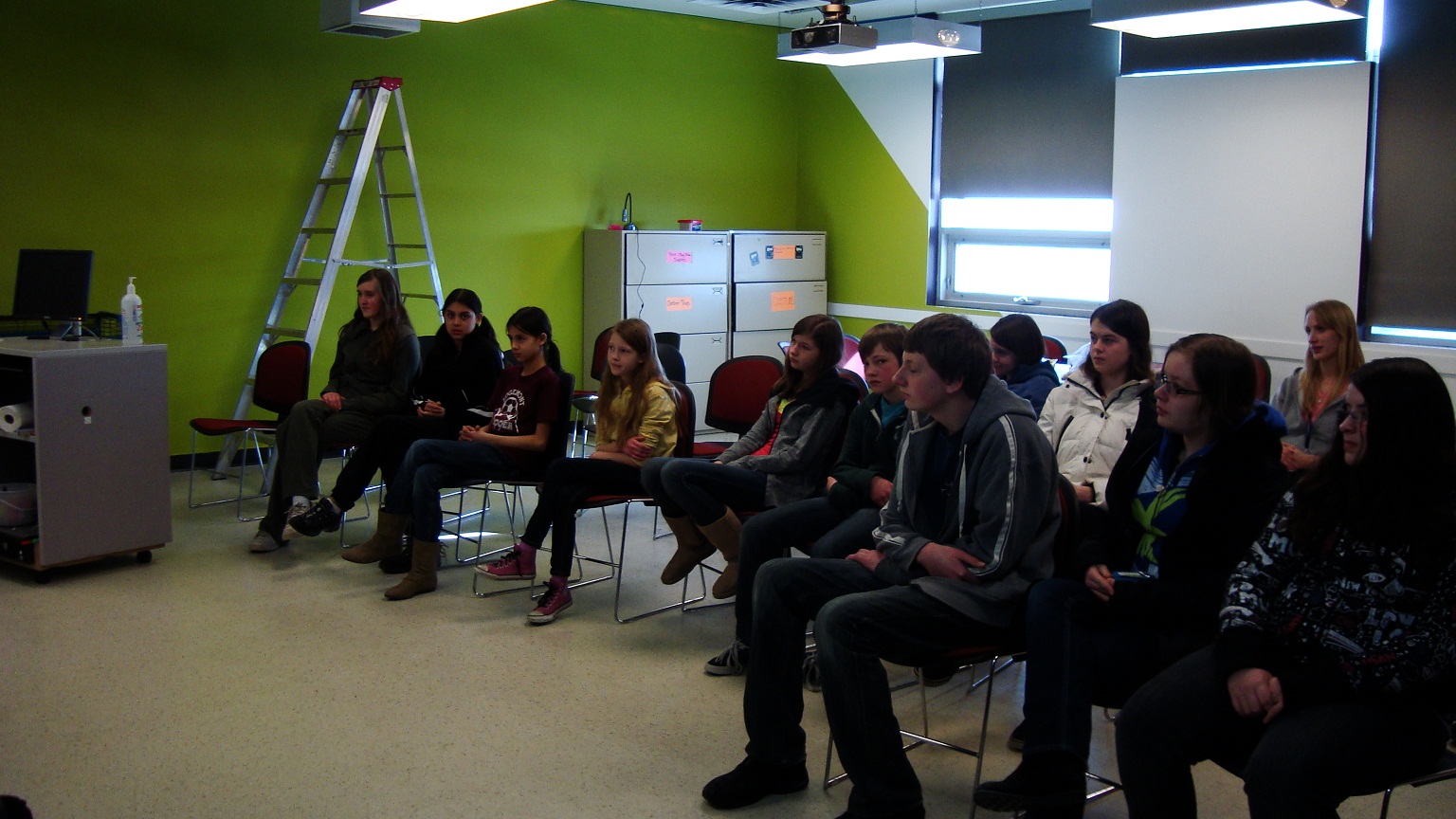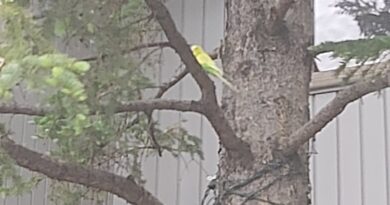The reason for home visits.
When placing a parrot into a new family – this is a big decision not only for the family making the commitment, but for us as an organization. As most parrots are coming from less than ideal situations, we want to ensure that the new family is readily prepared for any issues the bird may still have as well as ensuring that the environment is going to benefit the bird – not all family structures are going to work with every bird. With that said, we DO work with new families after placement and will continue to do so as long as they need it.
A few years ago we had an eager young family totally excited at the prospect of adopting a macaw – their application looked good and a home visit was scheduled. Upon arrival, we were directed to the basement apartment of a very small house. This space was maybe 600 square feet – the kitchen/dining/living room were all one big space divided by a wall – a small shower and 2 small bdrms. No large pieces of furniture – but if they wanted to bring in the macaw sized cage, they would need to get rid of the small couch – there was simply no room for a cage – anywhere in that space. There was no space for a play-stand – a boing – nothing – the bird would be in his cage or on his cage – and no space to fly if he chose to do so. We explained the needs of the macaw and gently explained that their living situation at this time would not fit a macaw very well – they offered to put the bird into a much smaller cage – half the size of his current one and 1/2 as tall – this is not acceptable. They went on to say that maybe a grey or a cockatoo would fit better. After much discussion it appeared that the idea was more of a novelty – because friends had parrots and they were so COOL that they just had to have one to.
Another very sad incident involved another household pet. When we do placements, we look at all the other animals in the home as well – we have successfully placed parrots in homes with cats/dogs/reptiles with no problem. For families with dogs, we have the bird along in a heavy duty wire carrier and watch the dogs behavior to the bird long before we even think of taking the bird out. A well trained dog with a LOW prey drive usually does quite well. Those that have dogs that are out of control – do not listen – and are trained with force ie: hitting/beating/slapping their dog – do not do well at all. We do not believe in forced – bully training for any animal!!
This particular family wanted a grey – and had a husky about 1 1/2 yrs old. This dog was out of control. Friendly but did not listen to anyone in the family. He refused to settle down and even after placing him outside, he continued to jump/bark at the door frantically to get to the bird. I knew it was not going to work. After some discussion, they brought the dog back in and he made a run for the cage which was on the table and actually tried to get up there – I picked it up and told them to hold their dog and explained that this would not work – his focus was on the bird – period – without some major training this dog would be a danger to any bird. As I was leaving – I set the carrier on the floor beside me – the dog got loose out of their grasp and ran full tilt to the carrier – lunged and knocked it over. The bird was not hurt and just further indications that a bird was not a good fit. About a month went by and we got an email that they had decided to purchase a bird from Petland and so far things were ok – exactly 27 days later, we got another email that the bird went to fly, and the dog grabbed it in midair – it died in her hands.
If you cannot fit a large cage, than a large bird is not a good choice – if you can’t handle a bird – as in – how to actually hold one – than you need to work with a bird until you are comfortable in handling one. If you cannot afford the extra dietary needs – such as fresh produce and pellets – than a bird may not be a good fit. In doing the home visits, we share the realities of parrot ownership – and what you can expect from a particular bird. If you have kids, they will be included in the visit.
Another home visit brought me to a home with 1/2 dozen birds – the home was disgustingly dirty as were the cages – while the birds were getting a proper diet, the mold in the bottom of the cages was simply gross – after some gentle instructions on cage cleaning and why mold spores are dangerous to birds – the decision was made to deny the application until the situation could be improved. They to decided to go to kijiji and offered their home as a “rescue” to any unwanted bird.
I have many more stories I could share but this should give you an idea of why we do home visits. We need to know that all family members are aware of the responsibilities and we need to know that the bird is going to be SAFE and cared for in the manner they deserve to be.
Our parrots deserve the quality of life they have NOW – not what they came from – and if we are not convinced that they will be in a safe environment – we will deny the application. Its heartbreaking to hear the stories from those who chose to disregard what we said and why and very frustrating to do a visit – see a dog with HIGH prey drive try everything to get to the cage and than the following day, see the family putting ads on kijiji looking for a bird. A clear indication to us that this family is not interested in helping a bird in need but rather in the novelty of owning a big parrot.
Parrots are a huge responsibility and we want to know that any family wanting to add one to their life is 100% AWARE of what they are getting into. These parrots deserve NO LESS….




